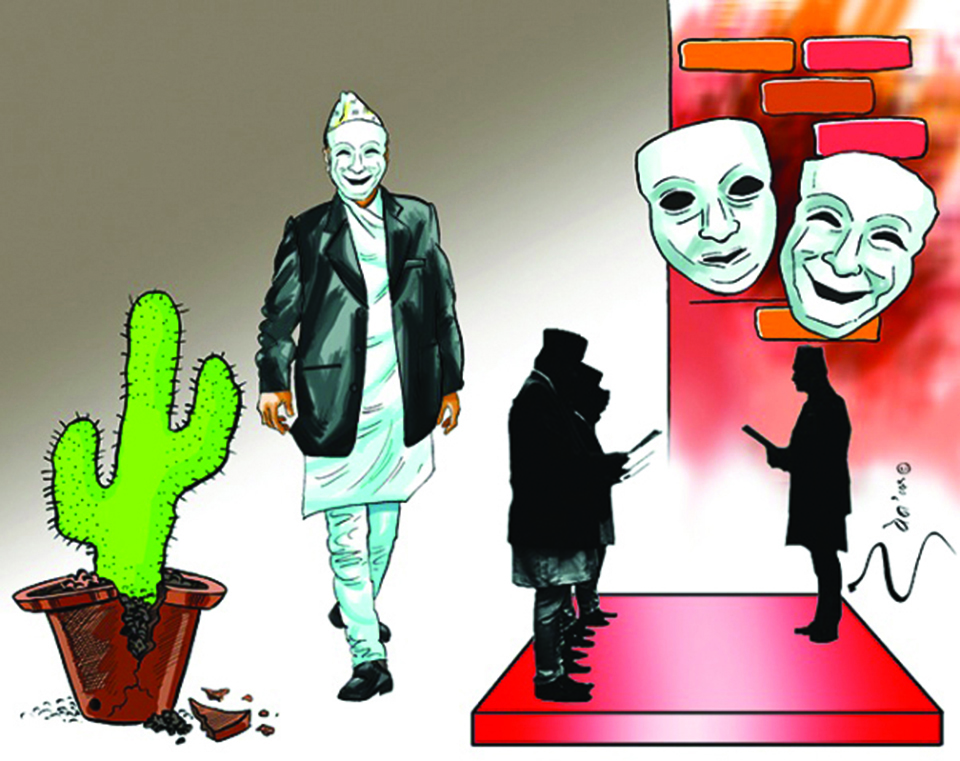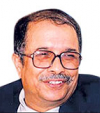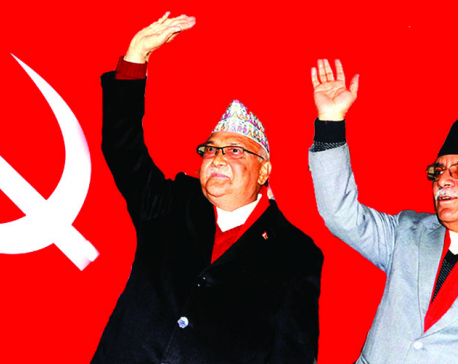
OR


Surya Nath Upadhyay
The author is former Chief Commissioner of the Commission for Investigation of Abuse of Authority (CIAA)news@myrepublica.com
More from Author
Corruption is no more only a case where one takes money straight away from the service seekers. It has taken a shape where it is difficult to find out who the culprit is
The nature of corruption is changing in Nepal. It is not a new phenomenon because everything changes with time. But corruption affects everybody and a change for the worst affects all. This is why it is a matter of worry for everyone.
Corruption is no more only a case where one takes money straight away from the service seekers and the anti-corruption agency nabs the corrupt right at the site. It has taken a shape where it is difficult to find out who the culprit is. A nexus has been built in such a way that one cannot identify the individual culprit. A policy is made for the better of the country but underneath there could be hidden objectives of making money by a group of people in the name of policy implementation.
The case of market-monitoring for assuring quality of goods may serve as an example. Apparently, market monitoring itself is a good act for it makes the businesses sell the quality products in the market. But we all know that Department of Food Technology and Quality Control cannot monitor all the shops because they don’t have the required manpower and equipments to do so. Yet, quality control inspectors might end up taking into control those unfortunate ones who have no big stake in this crime, while the big sellers may still remain out of the hook. Any such action may indirectly help certain sellers or the manufacturers to spread bad name against those who are selling or manufacturing the same kind of goods. The action initiated with supposedly good intention may end up benefitting the corrupt more than others.
For another example, the policy of executing a project through Users Committee sounds quite good and democratic. Some form of contribution by the users of the facility in cash and kind has been made mandatory for these projects. However, everyone knows that the cost of the project is inflated in such a way that it takes care of the amount which otherwise should have been contributed by the users. The resultant effect is that no user has to contribute a single penny or any labor for the project. Not only that, someone among the Users Committee members will be able to use or let his heavy equipment for the project, where from he will make money for himself.
On the surface everything looks fine and the books of account are just right. Yet the hidden benefit is right there in the policy process.
Conflict of interest
Conflict of interest is the breeding ground for corruption. Unfortunately, we have not paid much attention to this issue. There is no specific provision on this aspect of corruption in the Prevention of Corruption Act (2002). In 2016, an amendment in the Education Act (2071) was introduced to bar the opening of a school for profit making purposes. However, an exception was made for those schools which were established before the promulgation of the said amendment. Such schools could run by profit making objective. Clearly, this meant that in the country there would be two kinds of schools—those run by establishing a trust without any profit-making objectives and those which run as profit-making companies. It is apparent that this exception was engineered by some of the legislators who themselves own and run schools for profit motive.
In the case of Medical Education Bill the nexus between the power elites and the profiteers became so transparent that a common man on the street knew why Dr Govinda KC, a humble physician of a public hospital, had to go for hunger strikes risking his life for fifteen times. The nexus between Commission for the Investigation of Abuse of Authority (CIAA), the court and the power elites vividly came out in public some time back on the issue of raising quota for admission in MBBS course in the medical colleges.
People have learnt well why the case on raising admission quota was heard by the same judge in the apex court, how judgments were passed in favor of dubious medical colleges, why CIAA had a special medical doctor to advise the Chief Commissioner on these matters and why CIAA ran the entrance examination on its supervision in a medical college.
State capture
These examples suggest that there is a situation of state capture by the corrupt. In the lexicon of corruption, ‘state capture’ means a situation where the state machinery is under seize by the corrupt by building alliances among corrupt elements. Such alliances may not be built in a planned way but they evolve through the natural bondage among corrupt elements.
A couple of such cases have come into the surface in the recent times. The smuggling of 38 kilograms of gold revealed the ugly nexus between the police and the smugglers. The case of setting up Revenue Tribunal and acquitting hosts of revenue defaulters in the garb of settling the revenue arrears is something that’s been happening in this country for a long time.
So what should Nepal do in such situation? This is indeed very serious case of bad governance. As we are in a fragile political dispensation, this type of situation directly hits the state machinery and adds negativity to the effectiveness of governance. The first and the foremost attention of the government therefore should be directed towards improving governance.
Unless we have a disciplined and effective bureaucracy, governance does not improve. Political parties must desist in intervening unnecessarily in the functioning of the government machinery. Unless we deregister and impose a ban on trade unions of the government employees there won’t be a disciplined bureaucracy. Unfortunately, political parties have not only pampered these so-called trade unions, but also treated them like their sister wings.
Civil Service Act is being amended at this time and there is a strong lobby of these trade unions to have them recognized and let them function under the law. In the same vein of those trade unions, cartels and syndicates have also evolved in many service sectors over the years. Looking deep, one can see that they have strong ties with political parties. In such situation the law-enforcing agencies become completely helpless and ineffective.
Prime Minister K P Sharma Oli has vowed to uproot corruption to realize his vision of ‘prosperous Nepal, happy Nepali.’ If that’s what he actually wants, he must be courageous enough to make bold decisions which may not be popular for the time-being but which will ultimately contribute to creating corruption-free Nepal.
For that, he must start with building robust institutions. They are the building blocks of both stability and prosperity.
The author is former Chief Commissioner of Commission for the Investigation of Abuse of Authority (CIAA)
You May Like This

Corruption and citizens
A lone protester staging a hunger strike against corruption provides an illuminating view on how the absence of individual responsibility... Read More...

Mockery of socialism
Prime Minister committed to zero tolerance against corruption when he took office in 2017. Now this commitment is mocking... Read More...

Why corruption endures
Failure to secure justice through the transitional peace process provides the moral justification that sustains corruption in Nepal ... Read More...









Just In
- Forced Covid-19 cremations: is it too late for redemption?
- NRB to provide collateral-free loans to foreign employment seekers
- NEB to publish Grade 12 results next week
- Body handover begins; Relatives remain dissatisfied with insurance, compensation amount
- NC defers its plan to join Koshi govt
- NRB to review microfinance loan interest rate
- 134 dead in floods and landslides since onset of monsoon this year
- Mahakali Irrigation Project sees only 22 percent physical progress in 18 years









Leave A Comment